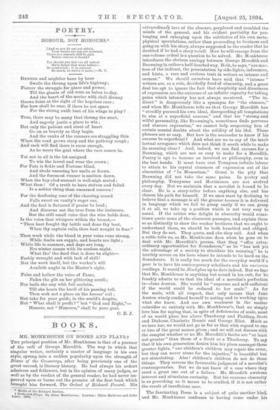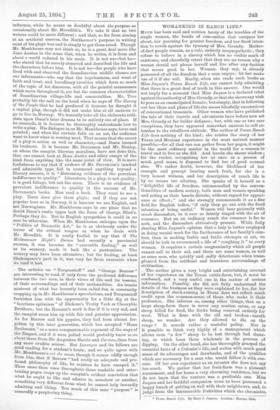BOOKS.
MR. MONK11017SE ON BOOKS AND PLAYS.f THE principal position of Mr. Monkhouse is that of a pursuer of the cult of George Meredith. The way in which that singular writer, certainly a master of language in his own style, sprang into a sudden popularity upon the strength of Diana of the Crossways, after being previously one of the great unread, is literary history. He had always his ardent admirers and followers, but in the opinion of many judges, as well as by the verdict of the general reader, he had never im- proved upon or borne out the promise of the first book which brought him forward, The Ordeal of Richard Feverel. His
• Motto of Sir Richard Burton.
t Books a%4 Plays. By Allan Monkhonse. London : Elkin Mathews and John Lane. 1894.
extraordinall'y love of the obscure, perplexed and troubled the minds of the general, and his evident partiality for pro- longing and enlarging upon the subtleties of his own meta- physical speculations, rather than proceeding to business and going on with his story, always suggested to the reader that he doubted if he had a story to tell. How he will emerge from the one-volume ordeal is a question to be solved. Mr. Monkhouse introduces the obvious analogy between George Meredith and Browning in rather a half-hearted way. Both, he says, "are mas- ters of the indirect, the presentation by side-lights, inferences, and hints, a rare and curious trait in writers so intense and earnest." We should ourselves have said that " intense " writers are, as a rule, decidedly fond of obscurity, and a great deal too apt to ignore the fact that simplicity and directness of expression are the outcome of an infinite capacity for taking pains which intensity has not always mastered. " The in- direct" is dangerously like a synonym for "the obscure," and when Mr. Monkhouse tells us that George Meredith has " steadily pursued his own ideal, disregarding all temptations to aim at a superficial success," and that his " strong and wilful personality, like Browning's, sometimes finds perverse and obscure expression," we cannot help suspecting him of certain mental doubts about the solidity of his idol. These phrases are so easy. But how is the succeeder to know if his success be superficial P And what are we to say of the inter lectual arrogance which does not think it worth while to make its meaning clear ? And, indeed, we can find excuses for a Browning, which are not so easy to make for a Meredith. Poetry is apt to become as involved as philosophy, even in the best hands. It must have cost Tennyson infinite labour to attain to his crystal clearness of expression out of the obscurities of "In Memoriam." Great is the pity that Browning did not take the same pains. In poetry and philosophy, Tennysons and Martineaus are not evolved every day. But we maintain that a novelist is bound to be clear. He is a story-teller before anything else, and has chosen his path for himself. If we once start by declining to believe that a message is all the greater because it is delivered in language which we fail to grasp easily if we can grasp it at all, we take up a position which is not very easy to assail. If the critics who delight in obscurity would some- times quote some of the obscurest passages, and explain them so as distinctly to show the weaker brethren that we ought to understand them, we should be both humbled and obliged. But they do not. They quote, and eke they rail. And when a critic tells ns, as Mr. Monkhouse does when he goes on to deal with Mr. Meredith's poems, that they " offer extra- ordinary opportunities for flounderers," as he " has not yet the advantage of a society to elucidate his meaning," he is terribly severe on his hero where he intends to be hard on the flounderers. It is really too much for the everyday world if a poet is to hare his contemporary scholiasts and his variorum readings. It would be 2E schylus up to date indeed. But we fear that Mr. Monkhouse is anything but sound in his cult, for he frankly admits to us that his ideal of a novelist's perfection is—Jane Austen. She would be " supreme and self-sufficient if the world could be reduced to her scale." As for the scale, with all respect, that only means that Jane Austen wisely confined herself to noting and to working upon what she knew. And our own weakness in the matter coincides so entirely with Mr. Moukhouse's, that we simply love him for saying that, in spite of deficiencies of scale, most of us would place her above Thackeray and Fielding, Scott and Dickens, Charlotte Bronte and George Eliot. Much as we love her, we would not go so far as that with regard to one or two of the great names given ; and we will not discuss with the essayist whether or no Mr. Meredith's faults are "at least not greater" than those of a Scott or a Thackeray. To say that if his own generation denies him his place amongst these greater lights, " our children's children may repair the error, but they can never atone for the injustice," is beautiful but not stimulating. Alas! children's children do not do these things. They reverse the favourable judgment of a novelist's contemporaries. But we do not know of a case where they erect a great one out of a failure. Mr. Meredith awakens interest and stimulates curiosity. But his extreme obscurity is as provoking as it seems to be studied, if it is not rather the result of insufficient care.
The fascinating Ibsen is a subject of quite another kind, and Mr. Monkhouse confesses to having come under his influence, while he seems as doubtful about his purpose as occasionally about Mr. Meredith's. We take it that no two writers could be more different ; and that, so far from aiming at an artificial success, the Northerner's purpose in writing most of his plays was and is simply to get them acted. Though Mr. Monkhouse may not think so, he is a great deal more like Jane Austen in the sense that, when he writes, it is from and about a world reduced to his scale. It is not we—but he— who stated that he merely observed and described the life and the characters before him. It is not we—for people who have lived with and observed the Scandinavian middle classes are our informants—who say that the hopelessness, and want of faith and trust, and hereditary troubles which form so much of the topic of his discourse, with all the painful meannesses which move throughout it, are but the common characteristics of Scandinavian village-life and communities. Mr. Tree probably hit the nail on the head when he says of The Enemy of the People that he had produced it because he thought it a capital play, though it did not make him at all anxious to go to live in Norway. We honestly take all the elaborate criti- cism upon Ibsen's later dramas to be entirely out of place. If he succeeds, it is because he thoroughly understands how to write a play. His dialogue is, as Mr. Monkhouse says, terse and pointed ; and when the curtain falls on an act, the audience want to know what is coming next. That means that the secret of a play is action as well as character,—and Ibsen learned his business. It is because Mr. Stevenson and Mr. Henley, on whom the essayist likewise moralises, have not done this, that one cannot look at Beau Austen and other essays of the kind from anything like the same point of view. It is mere foolishness to say that if authors of Mr. Stevenson's marked and admirable type fail to command anything beyond a literary success, it is "distressing evidence of the prevalent indifference to quality." Literature, in a play, is not quality ; it is good foliage, but not the stem. There is no evidence of prevalent indifference to quality in the success of Mr.
Stevenson's books. Men read a book. They want to see a play. Ibsen does give them plays ; and if they are not popular here as in Norway, it is because we are English, and not Norwegians. Mr. Monkhouse says in one place that no doubt Ibsen's rustic types lack the force of George Eliot's. Perhaps they do. But to English sympathies it could in no case be otherwise. When Mr. Monkhouse enlarges upon the "Politics of Dramatic Art," he is as obviously under the terror of the critical tongue as when he deals with Mr. Meredith. It is really foolish to say that if The Midsummer Night's Dream had recently a provincial success, it was because its " execrable fooling," as well as its scenery, made it look like a pantomime. The scenery may have been attractive ; but the fooling, at least Shakespeare's part in it, was very far from execrable when we read it last.
The articles on " Targuenieff " and "George Borrow" are interesting to read, if only from the profound difference between the two men, in their views of life and its lessons, of their surroundings and of their nationalities. An innate mistrust of what has honestly been called fun is constantly cropping up in Mr. Monlehouse's speculations, and Turguenieff furnishes him with the opportunity for a little dig at the "facetious optimism" of Dickens's Trotty Veck or Cheeryble Brothers; but the Russian's work is fine if it is very sad, and the essayist sums him up with fair and genuine appreciation. As for Borrow and his gypsies, they had been almost for- gotten by this later generation, which has accepted " Hans Breitnaann " as a more companionable exponent of the ways of the Zingari, and if it were polled would probably know more about them from Sir Augustus Harris and Carmen, than from any more erudite source. But Lavengro and•its fellows are good reading for a student's brain ; and we quite agree with Mr. Monkhouae's en au occur, though it comes oddly enough from him, that if Borrow "had really found philosophy of life, he rejoices y an adequate and pro- faned to have escaped it." Thus more than once throughout these readable and enter- g pages crops up the essayist's evident conviction that what he ought to like and admire is, somehow or another, something very different from what he cannot help inwardly admiring and liking. Too mach of this sane " purpose" is assuredly a perplexing thing.

































 Previous page
Previous page